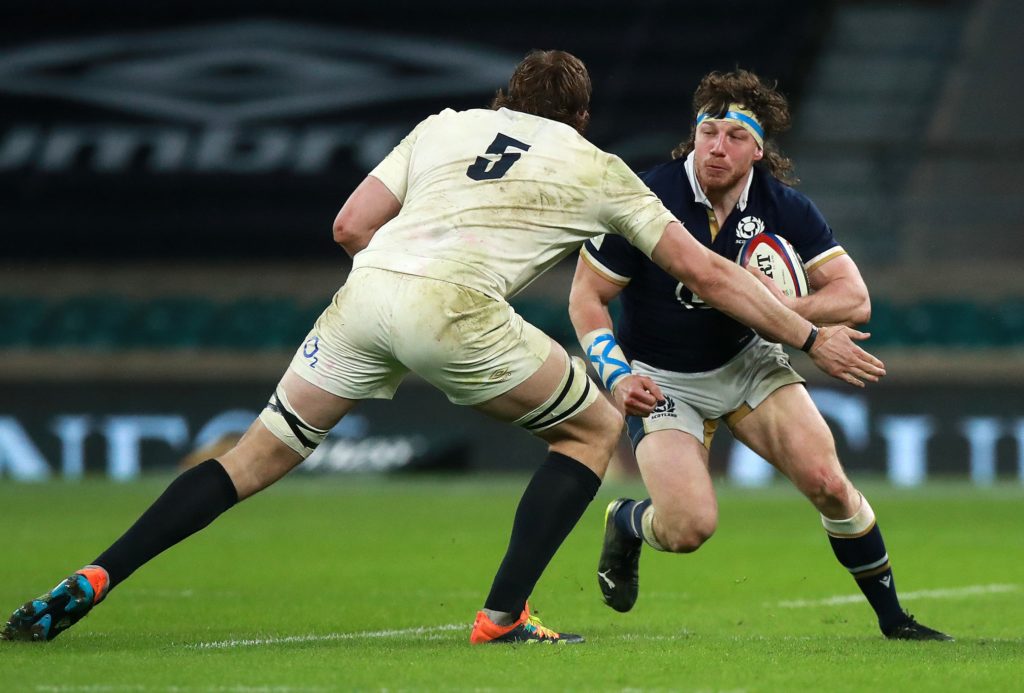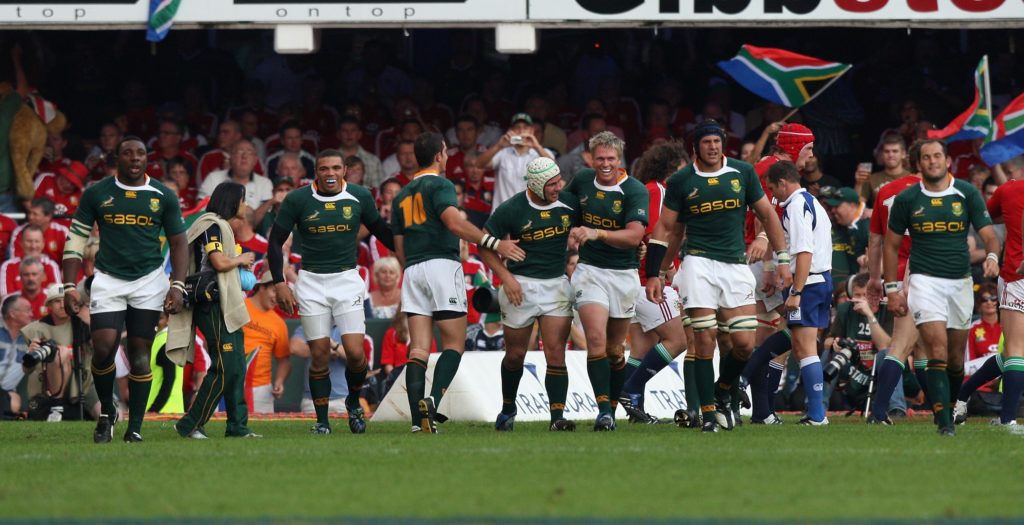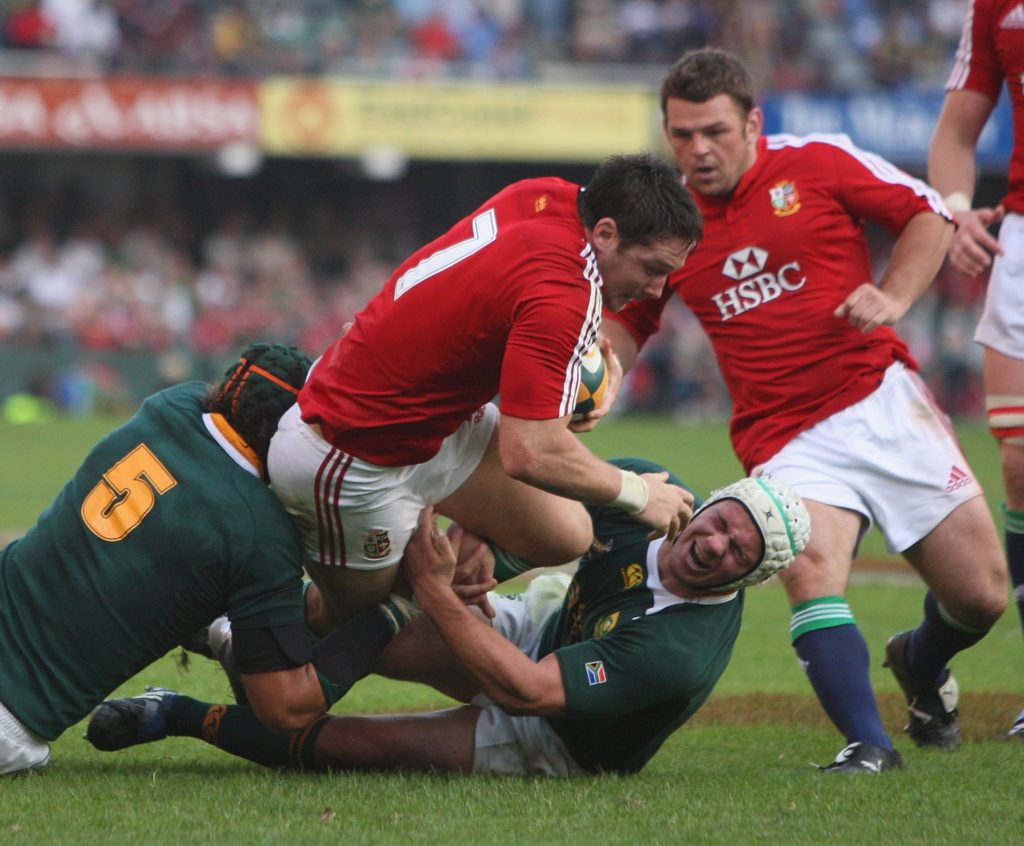Consider what transpired the last time the British & Irish Lions toured South Africa. Heinrich Brüssow, a specialist fetcher of modest physical dimensions, destroyed the Lions at the breakdown.
The Lions were made to regret the omission of Martyn Williams – another relatively small breakdown bandit – and reminded that, even in a size-obsessed South African rugby environment, bigger is not always better.
Warren Gatland, an assistant to head coach Ian McGeechan on that 2009 tour, would do well to remember the fact as he weighs up his squad options ahead of the 2021 series. Smaller openside flankers such as Hamish Watson and Josh Navidi, who excelled for Scotland and Wales respectively during the recent Six Nations, must be considered for their breakdown expertise.
Rassie Erasmus deserves credit for steering the South African rugby ship into more enlightened waters over the past three years.
As was the case in 2009, the Lions will need more than brute force to disrupt the rhythm of the Springboks.
Rassie Erasmus deserves credit for steering the South African rugby ship into more enlightened waters over the past three years. There has never been a shortage of large, powerful players in the Republic and yet Erasmus has attempted to strike a necessary balance between size and skill, which is why smaller players such as Cheslin Kolbe, Faf de Klerk and even skipper Siya Kolisi have been backed so wholeheartedly in recent times.
Indeed, it was Erasmus, in his capacity as Cheetahs head coach, who gave Brüssow his first taste of Super Rugby back in 2007. Naka Drotske took the coaching reins later that year and continued to back the pocket-sized battleship.

Springbok coach Peter de Villiers wasn’t short on outstanding back-row options. Schalk Burger, Juan Smith and Danie Rossouw formed the loose trio at the 2007 World Cup and were still a force in 2009. What’s more, Pierre Spies and Ryan Kankowski provided explosive options at No8. To put South Africa’s options into perspective, Duane Vermeulen was then considered surplus to requirements.
Nevertheless, the one-off fixture between the Cheetahs and Lions on June 6, 2009 represented an opportunity for Brüssow to challenge the back-row pecking order. Looking back, it’s fair to say that Brüssow’s influential performance may have altered the course of the tour as a whole.
“That was a long time ago… but the memories are still clear in my mind,” Brüssow tells The XV. “Growing up as a farmboy in the Free State, you dream about the chance to play against international teams. At that stage, I wasn’t in the Springbok squad, so I knew that the game between the Cheetahs and Lions might be my last chance of playing in an international game.
“I look back now and I realise how it all came together. I probably produced one of my best performances and we nearly won the game at the end [the Lions hung on for a 26-24 win]. It was like a dream… a little union like the Cheetahs taking on the combined might of the home nations.”
If you only pick players who can bully the opposition, sooner or later you will come up against another team that can match your size and strength – and they will bully you right back.
Heinrich Brüssow
Brüssow attended Grey College in Bloemfontein – a South African rugby factory that has produced 46 Springboks as well as hundreds of provincial players. After he made the step up to professional rugby, standing at 5ft 11ins and a shade under 16st, some felt that his size might count against his chances of competing at the highest level.
“It was difficult coming through the ranks at a time when most coaches were determined to pick players on their size,” he says. “But here’s the thing: if you only pick players who can bully the opposition, sooner or later you will come up against another team that can match your size and strength – and they will bully you right back. Then you will need something extra to win the contest.
“Someone like Rassie was always open to new ways of playing the game,” adds Brüssow of one of his first mentors. Erasmus – a multi-talented flanker – was also considered to be on the smaller side when he represented the Boks in the late 1990s and early 2000s.
“Rassie is one of the coaches who has moved past the ‘bigger is always better’ selection policy. We saw what was happening at the 2019 World Cup with a few smaller forwards and backs in the side. It’s great to see how much things have changed.
“Look, you can be smaller, but you still have to be strong enough to play the game. That’s always a given. You look at some of the smaller players today: really strong players who can thrive in contact, who can add something at the breakdown and in open play.”
David Pocock made an impact for Australia between 2008 and 2019 despite his 1.83m, 103kg frame. Michael Hooper, at 1.80m and 101kg, continues to terrorise opponents at the breakdown.
In 2009, however, there was no better exponent of the breakdown than Brüssow – not even the All Blacks supremo Richie McCaw. Following the fixture between the Cheetahs and Lions in Bloemfontein, De Villiers brought Brüssow into the Springbok mix.
South Africa beat the Lions in Durban and Pretoria to secure a famous series victory. Later that season, they recorded three straight victories over the All Blacks and won the Tri-Nations. What’s more, the Boks finished 2009 at the top of the rankings.

“I was never the biggest, tallest or fastest,” says Brüssow. “But I had built up my game over the years and the breakdown was certainly one of my strengths.
“At that stage, there was a… call it a loophole… in terms of the way the game was played and officiated. So there was a gap for someone like me to make my presence felt.
“You would get the 50/50 calls at the breakdown as a defending player. A year later, the officials changed the rules again to try to negate the influence of the fetcher and to speed up the game.”
Burger was unavailable for the first Test against the Lions due to injury. De Villiers asked Brüssow if he would be ready to start.
“I was fortunate in that the Boks had won the World Cup in 2007 and were a very settled side. The coaches told me to focus on my own game. It was very much a case of the right team at the right time,” he says.
Gary Gold, who served as De Villiers’ assistant and forwards coach in 2009, remembers how the team gelled to give the tourists one hell of a shock in Durban.
Brüssow was world class… He picked up penalties for fun, he was like a ferret. His timing was immaculate. The Lions weren’t prepared for it.
Gary Gold
“One of the biggest untold stories of that series was our strength over the ball,” says Gold. “Captain John Smit moved to tighthead to accommodate Bismarck du Plessis, who was at the height of his game. Bismarck was so good at the breakdown and Jean de Villiers was another who didn’t get enough credit in that area.
“Juan Smith and Schalk Burger were good in that respect, but Heinrich Brüssow was world class. We had the potential to put a genuine poacher on the ball at every second or third ruck. We were a threat across the field if the Lions didn’t get their ‘cleaners’ to the breakdown on time.
“Brüssow picked up turnover penalties for fun, he was like a ferret. His timing was immaculate. The Lions weren’t prepared for it and I don’t think they understood the consequences of losing that particular battle on the ground.”
To this day, Gold doesn’t know why McGeechan backed David Wallace at openside ahead of Williams.
The Lions went toe to toe with the Boks at the collisions for much of the series, yet lacked an edge at the breakdowns. It was only when Williams started in the third Test – a dead rubber in Johannesburg they won by a comfortable margin – that the magnitude of the error was made clear.

“It’s funny, because Gatland [the Wales head coach at the time] didn’t really pick Williams at openside when Wales played against South Africa either,” says Gold. “I remember the one game where Williams did in fact start for Wales in Cardiff. They murdered us at the breakdown and we were lucky to pull off a close win.
“We caught the Lions off guard at the breakdown in the early parts of the series. To be honest, that wasn’t really part of the plan, we were more focused on the set-piece battle. But that success at the breakdown gave us a chance to win penalties and build scoreboard pressure through our goal-kicking sharpshooters.”
The likes of Smit, Bakkies Botha, Victor Matfield and Smith were at their peak in that Lions series. While he played an influential part in the campaign, Brüssow – then 22 – feels lucky to have rubbed shoulders with so many all-time greats.
“2009 was the best year of my career. That game for the Cheetahs against the Lions stands out. The series win against the Lions was fantastic. We went on to win the Tri-Nations by beating the All Blacks three times in a row. It doesn’t get much better,” says Brüssow.
“The settled nature of the team made it easier for me. I wasn’t there when they built up the team between 2004 and 2008, so it was more a case of coming in and doing my job. In later years, playing for different teams in Japan and England, I would take on different roles and responsibilities. At the time of the Lions series, I was just encouraged to do what I do best.”
Brüssow travelled with the Boks to the 2011 World Cup but struggled to regain his previous form on the back of several serious injuries. He missed out on selection for the 2015 World Cup squad and did not add to his 23-cap tally thereafter.
“I was recalled to play a few games for the Boks in 2015, and I was grateful to wear the green and gold again. It was difficult to be left out of the World Cup squad but I understand that sometimes that’s the way it goes. I have no regrets about my career,” says the 34-year-old.
“I enjoyed a new adventure with the Red Hurricanes in Japan. It was a big step for a boy from Bloemfontein who initially couldn’t see himself playing for anyone besides the Cheetahs. I was forced to grow as a person once more when I went to play for Northampton Saints [in 2018 and 2019].
“I had a tough time with all the injuries at that stage. Off the field, I met a lot of good people. Maybe that made it easier for me to retire in 2019.
“I realised that I was never going to be the player I once was. At the same time, I was grateful for the chance I’d been given over the course of my career. Not everyone gets that opportunity.”
“That should be one hell of a contest. Hopefully there will be crowds because the atmosphere is what makes a Lions series.
Heinrich Brüssow
Brüssow and his family have relocated to George in the Western Cape, where he works in construction. He has two young children and admits that he doesn’t have much time to watch rugby these days.
The showdown between South Africa and the Lions, however, will not be missed.
“That should be one hell of a contest,” he says. “Hopefully there will be crowds because the atmosphere is what makes a Lions series.
“The Boks haven’t played together since 2019 and that’s an obvious problem. That said, it gives me confidence to know that Rassie and Jacques Nienaber are involved as coaches.
“I worked under them in my early days at the Cheetahs, and again after Rassie joined the Boks as a technical advisor at the 2011 World Cup. There is a strong core of players who won the World Cup a couple of years ago.
“All in all, it would be unwise to write the Boks off.”
More stories from Jon Cardinelli
If you’ve enjoyed this article, please share it with friends or on social media. We rely solely on new subscribers to fund high-quality journalism and appreciate you sharing this so we can continue to grow, produce more quality content and support our writers.



Comments
Join free and tell us what you really think!
Sign up for free